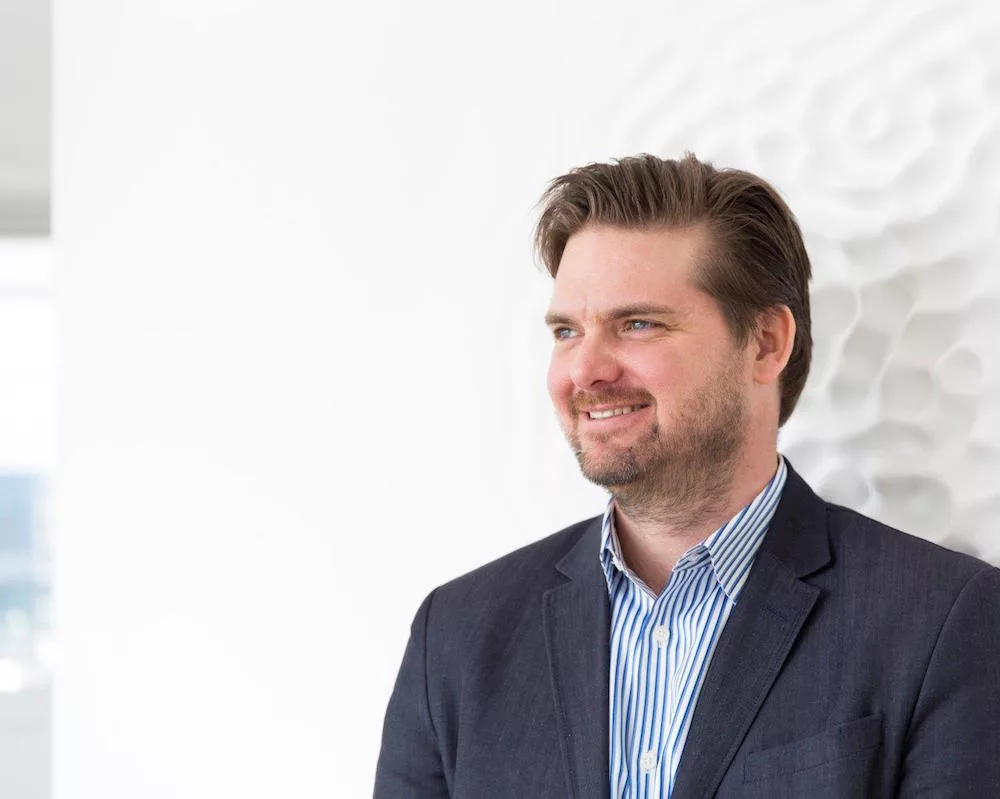Ben Powell began his entrepreneurial journey in Mexico in the early 1990s. After founding CityGolf Puebla, a miniature golf course and family recreation center, he was thirsty for more. “Through that experience, I learned that entrepreneurship has the power to transform lives in poor communities,” Powell says of his early days as a business owner.
“It made me feel like I had something to contribute, and I wanted to make it easier for early-stage entrepreneurs to gain access to the knowledge, networks, and capital they need to grow their business and create a positive impact in their community. It was a direct experience that made see social entrepreneurship and innovation as critical to solving the problems of the 21st century.”
Over a decade later, while attending grad school, Powell came together with a group of American, European, and Latin American students to form Agora Partnerships: a platform that supports early-stage, mission-driven businesses in Latin America. Its flagship program, the four-month Agora Accelerator, empowers entrepreneurs with the knowledge, support networks, and capital they need to succeed.
The organization got its start in Nicaragua, the home country of cofounder Ricardo Terán Terán, which Powell says gave the Agora team a unique vantage point from which to view the needs of today’s social entrepreneurs.
“Many Latin American entrepreneurs aren’t given the same respect as their counterparts in the US,” says Powell, who now serves as CEO of Agora. “Investors don’t look at them and see a future Mark Zuckerberg, so they often need more support.”
Since 2011, the Accelerator has reached 156 companies with mission-driven business models in 20 Latin American and Caribbean countries. Thanks to $71 million in raised capital, these firms now employ a collective 5,000 people with an annual average revenue growth of 41 percent.
The results are impressive, but Powell says the world needs far more successful social entrepreneurs to confront an uncertain future. “We need to build our entrepreneurial muscles as a society if we hope to confront the incredibly dangerous challenges the planet is facing right now.”
We spoke with Powell about the challenges facing social entrepreneurs in Latin America and around the world and about what entrepreneurs really need to succeed.
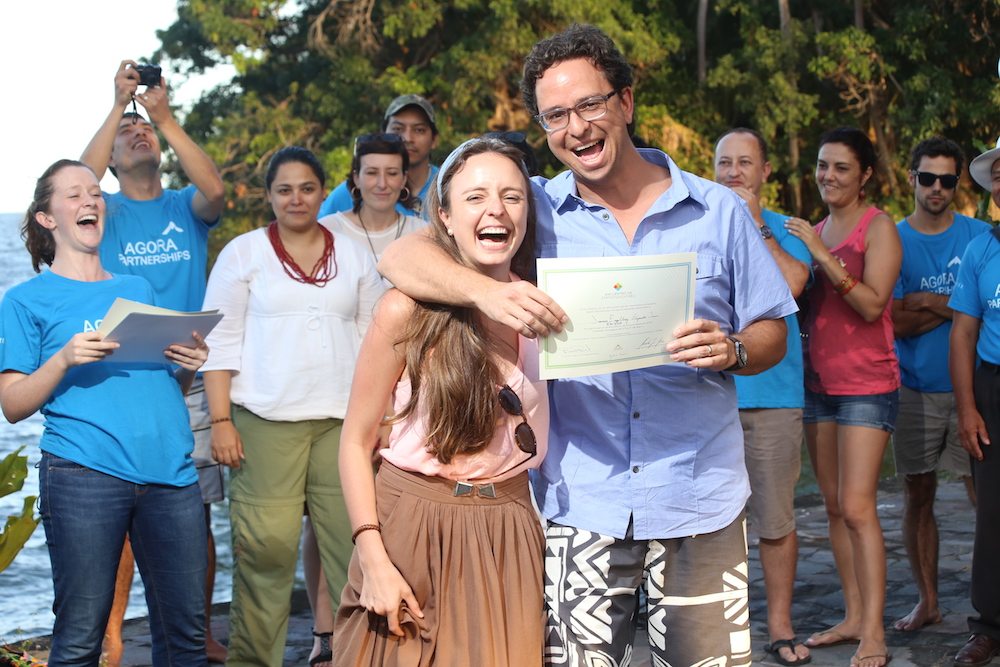
The BAOBAB team celebrate their graduation from the 2014 Agora Accelerator.
After 12 years of growing Agora Partnerships as an organization, what have you learned along the way?
Ben Powell: At Agora, we’re trying to be a platform that enables impact investors, partners, mentors, funders, and others who care about entrepreneurship to channel their resources effectively to support entrepreneurs. To do that, we’ve evolved a lot, and we’ve definitely failed a lot as well.
In fact, we’re publishing a report on the first venture fund we launched back in 2006, called the Agora Venture Fund. We invested in 12 Nicaraguan companies — a mix of equity and debt — at an average of $57,000 each. It was one of the first impact investing funds in the world, and it lost almost all of the money.
We learned a tremendous amount through that experience, and the challenges we faced made us stronger as an organization because they taught us humility and gave us perspective. The entrepreneurs we serve have to overcome so much and the barriers they face are so big, but a little bit of intervention and support at the right time can make all the difference.
How is social entrepreneurship different in Latin America compared to the rest of the world, and to the United States in particular?
BP: With the caveat that Latin America is extremely diverse, let’s focus on a couple of broad conclusions.
The Gini coefficient — a statistical measure of wealth distribution — is higher in Latin America than anywhere else in the world. This means the contrasts in wealth and opportunity are very stark — I would say more stark than in the US.
That means many people are forced to be entrepreneurial just to survive, because there are no jobs. Although few of these people build their companies to an IPO, they have figured out how to hack life to survive and find opportunity. And because there is a strong social cohesion in families — the family structure is generally quite strong throughout Latin America — there is a sense that life can get better if you work hard and have a good idea.
But an incredible scar runs through Latin America. The history is really horrific. Yet you see resilience among indigenous communities throughout the region — and those communities significantly influence entrepreneurship there. The indigenous worldview sees the role of human beings differently than Western capitalism: Indigenous entrepreneurs are connected to each other and to nature in a way many of their American counterparts are not. They see themselves as a piece of this vibrant ecosystem and not separated from it.
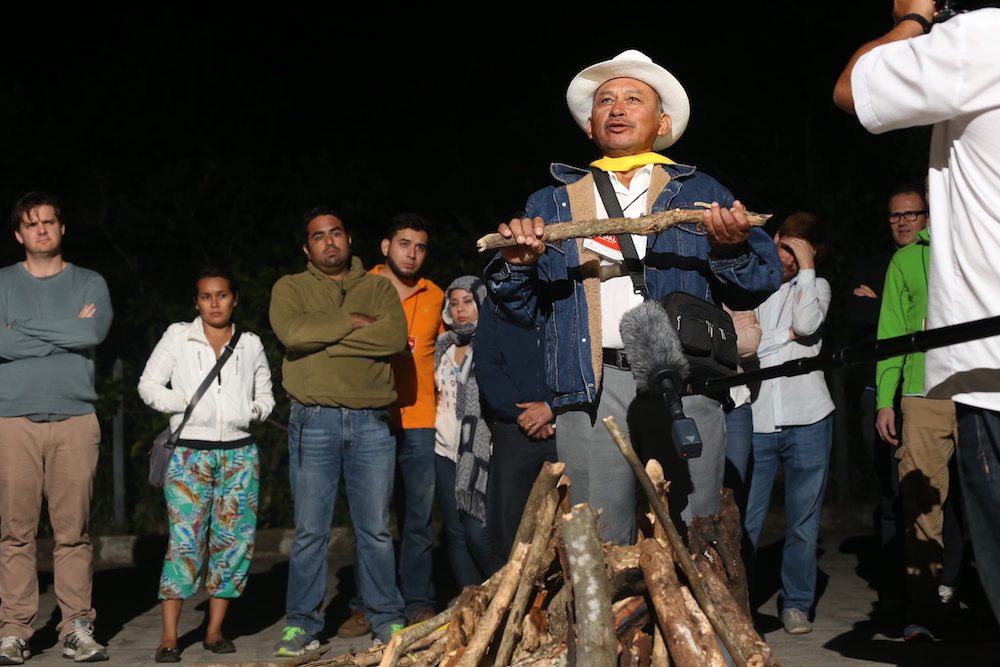
Vidal Pat, founder of MielPat, during a 2014 commitment ceremony. This ceremony takes place at the start of each Accelerator retreat and gives entrepreneurs a chance to publicly share their commitments with one another.
How does this influence the way Latin American entrepreneurs do business, particularly indigenous business owners?
BP: The separation you see so much in Western civilization — me versus you — is not as strong in indigenous cultures. Instead, there’s much more of a sense that we are in this ecology together and that we have to take care of it. Many environmental regulations set in the West don’t apply, because these companies already exceed them.
Take MielPat, a small company we work with in Campeche, Mexico, as an example: They make incredible organic honey by using centuries-old techniques that protect bees and result in a high-quality product. They’re not only keeping their traditions alive, but they’re now able to connect with markets, make more money for their product, and slowly grow the business.
There’s a side of me that thinks all entrepreneurs are the same at the end of the day. But the indigenous heritage — and the resilience that comes from having to be entrepreneurial — prepares Latin America really well for the kinds of businesses that will emerge in the 21st century.
You’ve observed businesses across diverse communities. Taking into account all you’ve learned, how do you feel about the community as a stakeholder, and how would you suggest that social entrepreneurs connect with their communities?
BP: The interdependency between your team, your customers, and your community is personal. It’s especially important for small companies to be on good terms with everybody and to intentionally create value for all their stakeholders.
We have a selection criteria for our accelerator program, which includes assessing companies based on four core values that correlate highly with successful entrepreneurship: empathy, curiosity, agency, and perseverance. Of these, empathy is arguably the most important. We’ve rejected companies because the founders lacked empathy, and that’s not leadership. A strong social entrepreneur can listen to different customers and put themselves in other people’s shoes. They also see every employee as a core piece of the business and not simply an input.
Take, for example, a textile factory in Nicaragua or China that’s run by an absentee landlord. It may employ a lot of people, but the employment doesn’t go anywhere. It’s a job that people take because they are desperate, and there is no real sense of community.
Contrast that with the story of Aida Mayorga, a Nicaraguan woman who started her textile company, Oscaritos, with a $100 micro-finance loan. After years of hard work, she now employs 45 people to produce high-quality uniforms and clothing for children. The way Aida organizes her team is totally different from a large textile factory: She buys beans from the local government warehouse to make sure her employees always have access to affordable food. She offers them interest-free loans if they fall on hard times. If she notices local youth going down a path that could threaten her community, she steps in and offers a stable job and dozens of “moms” to look out for them.
It’s important to understand that the workers in most of these companies are not wealthy people. They’re living paycheck to paycheck. They often don’t have access to healthcare or to many things that we in the Western world take for granted. Often their customers are also low-income, so these social entrepreneurs have a tremendous responsibility for the people they serve. It’s about more than profit maximization or trying to extract the greatest possible value from employees or customers. It’s about truly solving a problem and looking at value-creation holistically and not just in terms of the bottom line.
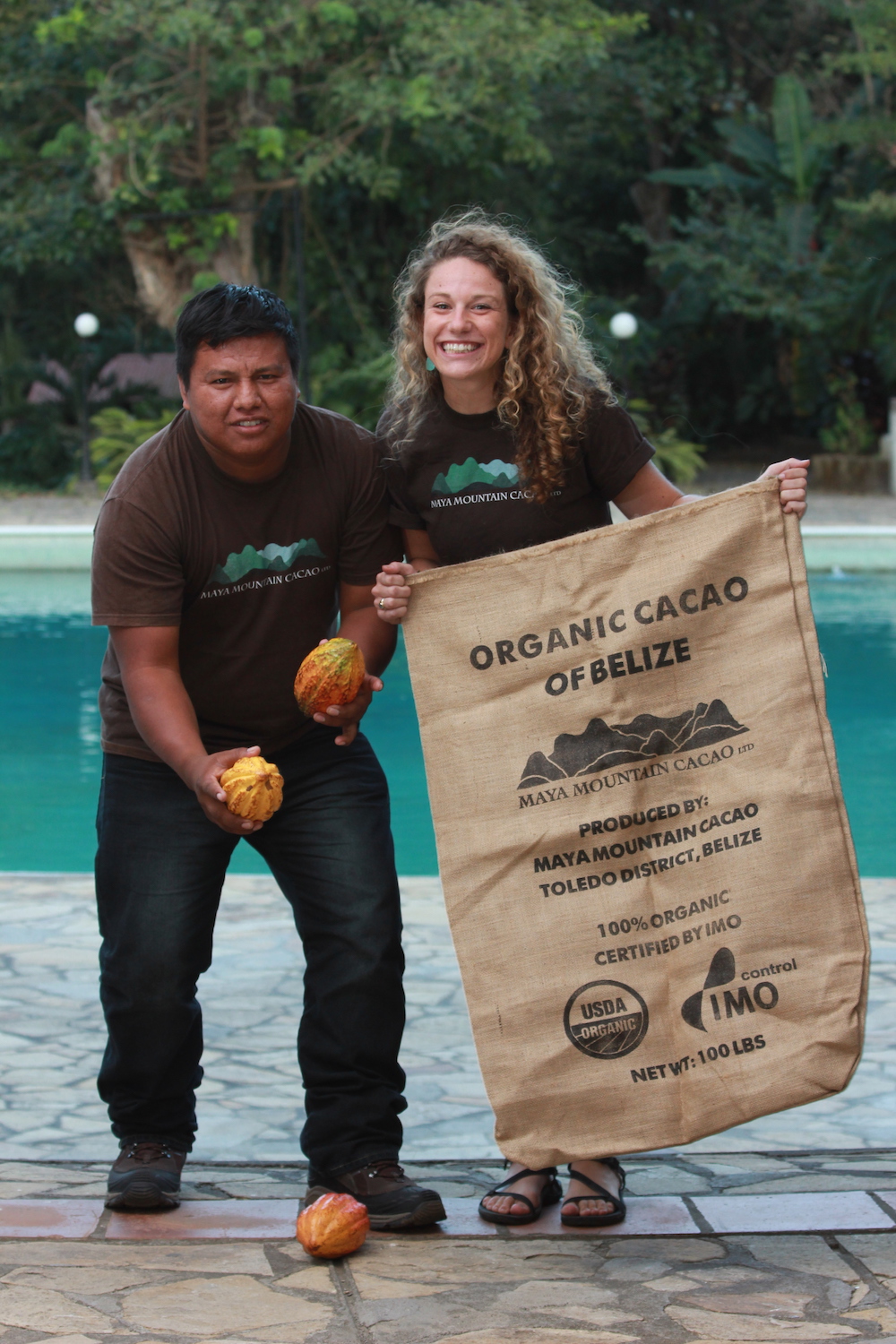
Gabriel Pop and Emily Stone, cofounders of Uncommon Cacao (then Maya Mountain Cacao), during the 2014 Accelerator retreat graduation ceremony.
You say it’s important for social entrepreneurs be on good terms with everybody in the local community. That sounds hard and not always realistic. There’s bound to be somebody who doesn’t like what you’re doing or feels threatened by it. How do you deal with that?
BP: When you’re doing it right, the people who feel threatened are your competition. Maya Mountain Cacao, which has since changed its name to Uncommon Cacao, is a fabulous example of this. Emily Stone co-founded Maya Mountain with a Belizean cacao farmer who is part of the ethnic Kekchi Mayan community. They set out to completely disrupt the cacao industry by eliminating middlemen and selling directly to high-end companies that want to ensure their chocolate is produced in an ethical and sustainable manner.
They started to convince the local farmers to sell them their cacao beans as opposed to the local fair trade collectives. As it turns out, by eliminating a number of levels of intermediation, they were able to offer a better price, better service, better payment terms, and additional technical assistance.
The farmers benefitted from the value chain, but Emily came into huge conflict with the local Fair Trade Association. She was taking their customers away, and they were not happy. But she simply had a better product and better service, and now I think she has 90 percent of the cacao market in Belize. She and her team completely shifted the industry and permanently shifted the price that farmers can get for their cacao in Belize, because it’s their price. It’s not the global commodity price plus a small percentage increase, which is what the fair trade collective offered.
I’m not trying to say it’s easy. What these folks are doing is incredibly difficult. But if you feel that your work has true purpose, you’re going to be able to continue doing it even if it’s really difficult. An accelerator program or any entrepreneurial outreach program can be very helpful in building that sense of solidarity, community, and trust.
And that’s the other thing: In Latin America, there’s not a lot of trust. This is part of the cultural challenge. There is not a lot of trust in government. There is a whole segment of folks in Latin America who are extremely suspicious of business, so that makes it even harder when you’re trying to start a business that has a strong social mission. Sometimes you have to overcome real skepticism that you’re just another avaricious business person.
Can you offer any advice to early-stage entrepreneurs about how to build trust, engage local communities, and deliver a business model that creates value?
BP: Ask yourself questions like: What does my community need, and how do I add value to the community? We ask every entrepreneur these questions in the selection process, and we engage in an ongoing dialogue with them so they don’t have to figure it out by themselves.
It’s a holistic process, because what entrepreneurs really need is someone to walk with them. They need someone they can trust and someone who will listen to their hopes and dreams, as well as their fears and insecurities. When you know how you’re creating impact as an entrepreneur, it gives you energy, purpose, focus, and strength.
But as vital as outside support is, entrepreneurship is a very difficult and particular endeavor, and you need to know yourself. Can you internally generate energy to persevere? Are you curious and open to possibilities? Are you willing to pivot if need be? Entrepreneurship is a mindset, and I think it was best expressed in the life of Benjamin Franklin. I would advise all young social entrepreneurs to read about Benjamin Franklin’s life. He was not a great father and family man, but he was a guy who had the right attitude for successful social entrepreneurship.
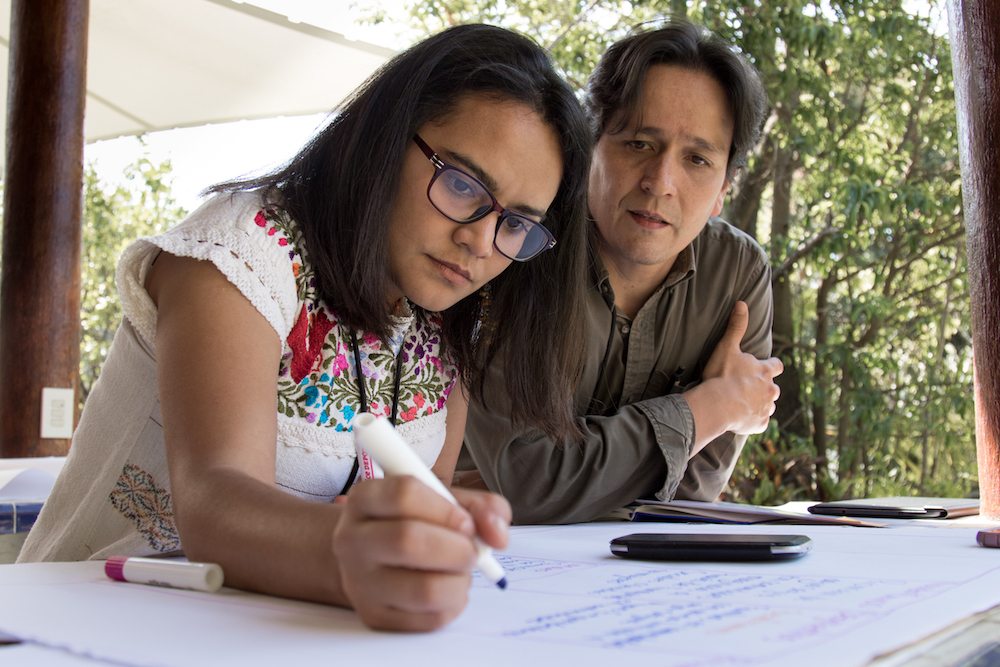
Agora entrepreneurs from Indigo Impacto work on their business model canvas during Agora’s 2017 retreat.
It seems like entrepreneurs should do a lot of questioning — about themselves and about the needs of their communities — before getting started. Any other questions they should ask?
BP: You need to balance technical questions and more personal questions to understand the economics of your business and the fundamental drivers of value.
Often entrepreneurs have difficulty explaining their businesses, so it’s important to be clear about the basics: What are you producing, and what are you selling? You also have to be tough on yourself about time management: How am I spending my time, and am I spending it in the best possible way? One of the biggest challenges for most entrepreneurs is investing their time correctly.
It’s equally vital to understand your personal support network before you jump into this business. I would not have been able to start a nonprofit if I didn’t have an incredibly supportive wife who believed in our mission and allowed me to go on this crazy entrepreneurial journey while she worked a steady government job with healthcare. Some folks are not set up to be successful entrepreneurs because they don’t have the social capital.
Starting a business is very, very personal. But if you are thoughtful about your own self-mastery — which includes being open and developing ways to cope with failure and stress — you’ll be in much better shape. As Howard Thurman said: “Don’t ask what the world needs from you. Ask what makes you come alive, and then go and do that, because what the world needs is people who’ve come alive.”
Any last words of advice?
BP: We’re at a very exciting time in history. A new movement and a new consciousness is emerging. To be successful, the social entrepreneurship movement needs to be very practical, focused, and pragmatic. But we as social entrepreneurs also need to recognize that if we don’t love ourselves, if we’re not happy with ourselves and resilient, then we’re going to crack when it gets tough — and it will get tough. Building your own emotional self-care muscles as an entrepreneur before launching your business is a better use of time than reading how-to books.
